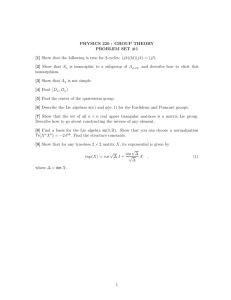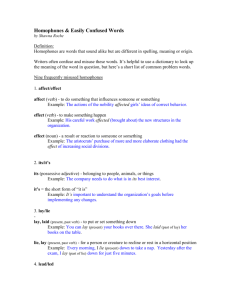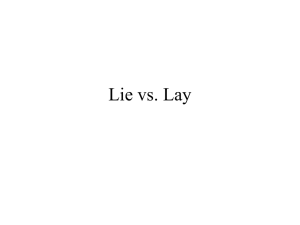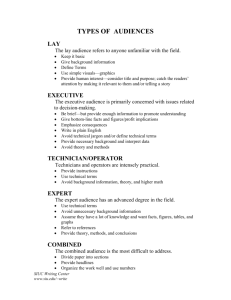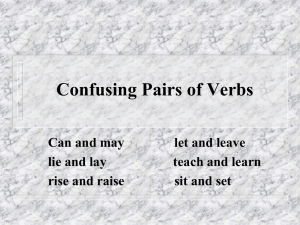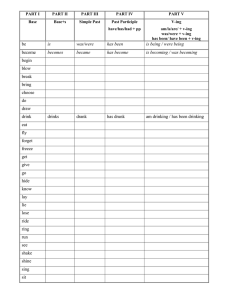Commonly Misused Words and Phrases CARLOS MARGO
advertisement
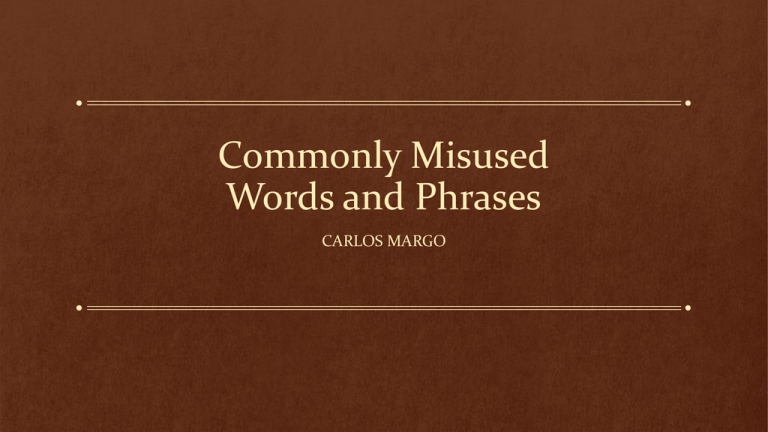
Commonly Misused Words and Phrases CARLOS MARGO The Importance of Writing Well • Communication is more precise and effective. • Your message is taken a lot more seriously. Adds credibility. • More professional. • Businesses report that communication skills are the single most desirable trait in new employees. Writing poorly makes you look ______________ Your versus You’re Your is showing possession. • I like your dress. You’re is a contraction for You are. • You’re a wonderful person. Wrong: Your invited. Right: You’re invited. (You are invited) Good versus Well Good is an adjective. (a good book, a good job.) Well is an adverb. (He runs well. He did well on his exam. I’m doing well. ) Wrong: I think I did good on my test. Right: I think I did well on my test. Its versus It’s Its is a possessive pronoun. Possessive pronouns never have apostrophes. The check is on its way. The dog scratched its leg. It’s is a contraction of it is or it has. It’s going to rain today. It’s been a long day. Although ________ not yet fall, this tree is already losing _________ leaves. Lie versus Lay Lie: To rest or recline on a surface. It’s late, so go lie down. Lay: To put or place. Lay the book on the table. Wrong: I’m going to lay down. Right: I’m going to lie down. Chickens lay eggs. I lie down when I’m tired. To, Too, Two To: a preposition. (I gave it to you.) Too: used when adding additional information. (This is too much information.) Two: a number (I own two dogs.) She was too mean to me, so I skipped two days of practice. Advise versus Advice Advise: (verb) To offer a suggestion or information. Please advise if you will be attending today’s meeting. My sister advised me not to drive in the storm. Advice: (noun) A recommendation or opinion offered as guidance. His advice was good and everyone listened to him. I am seeking your advice in this matter. WRONG: Please advice. He and I She and I Wrong: Him and I or Her and I. Her and I will be in the same class. Right: He and I or She and I. She and I are riding in the bus together. I told my brother that he and I should open up a business. Use of the Apostrophe • When to use: • To show possession • Employee’s uniform • Gerald’s check. • To show contraction • He’s very angry. • It’s not up to you. • To form plurals of certain letters or words. Wrong: Who’s chili is tastiest? Right: Whose chili is tastiest? Email Etiquette 1. 2. 3. 4. 5. 6. 7. 8. 9. 10. 11. 12. 13. 14. 15. 16. 17. 18. Email is permanent and omnipresent. You are representing South Texas College. Always use STC email for business. Lacks body language. Always reply to your emails. Proofread every message. Never send an email without doing this. Always be courteous and professional. Don’t over use CC and Reply All. Write your email then add the address. Always use greeting and closing. (Dear John) (Sincerely) Always include a clear subject line. (Meeting Date Changed) (Suggestions for your report) Say please and thank you. Use Mr., Ms. Be concise. Shorter is better. Avoid ???? and CAPS Avoid abbreviations. Use BCC when sending email to large group. Never email confidential information. Actual emails • Thank you for your e-mail, I will be out of the office Monday, April 06th-10th, I will reply to emails at my first available opportunity. If you have an immediate need, please contact Sue at 872-5555. • Thank you for your e-mail, The College will be close Monday, March 9th- 15th due to Spring Break. As such I will be out of the office Monday, March 09th15th, I will reply to your email upon my return • Debbie, I need your assistance for this PO since Joe needs to pick up the car. You’re help is greatly appreciate it Thanks, Monica Actual emails • I need you to send me the quarterly report immediately. It was due YESTERDAY. • Are you going to sign the NOE???? • Will these 2 timecards be approved? It’s been over a month and we are already into next pay period. PLEASE ADVISE. ---Respect the position, if not the person. Summary • Effective writing can be learned. • Read, write, repeat. • When in doubt, figure it out.

